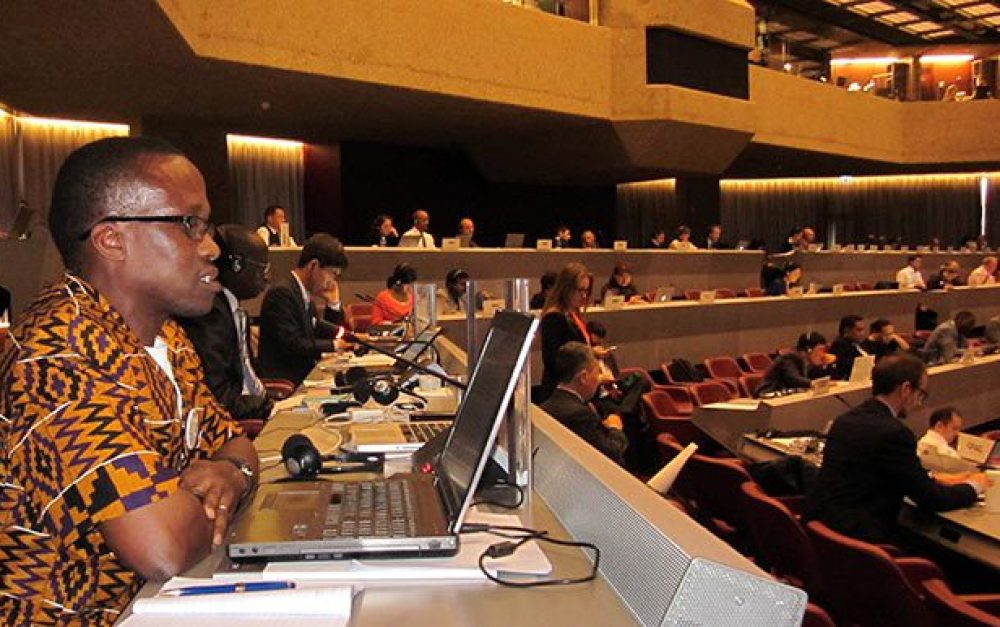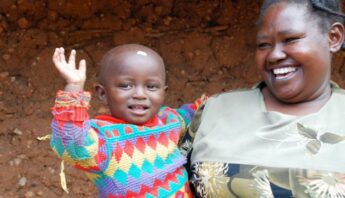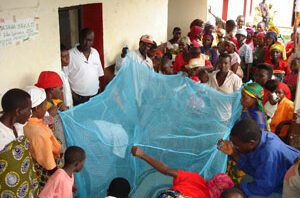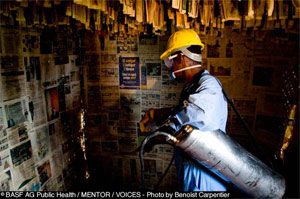Every year, our PAN International partners carry out amazing on-the-ground campaigns for safer food systems. As a network, we also have a long history of influencing global policies by participating in international treaties. One such gathering is taking place right now in Geneva, and PAN activists from all five regional centers are participating.
The key role PAN plays in these meetings is bringing the realities of pesticide exposures — both the latest science and stories from the field — into the room where high-level decisions are being made. Our active participation has led to significant wins over the years, like a global ban of the hazardous pesticide endosulfan, and strong restrictions on the use of DDT.
The Stockholm Convention on Persistent Organic Pollutants (aka, “POPs Treaty“) targets toxic, persistent chemicals for global phaseout. So far, participating countries have targeted 25 chemicals to phase out or restrict; 15 of them are pesticides.
The Rotterdam Convention on Prior Informed Consent (aka, “PIC Treaty”) maintains a list of chemicals that have been banned in participating countries due to concerns health or environmental impacts, and requires exporters to notify importing countries of those bans. While the U.S. has not ratified either of these treaties, the U.S. delegation is at the table and wields considerable influence.
The players & pesticides
Here’s an update on what we’re working to accomplish at the Conference of Parties (COP) in Geneva this time round.
Paraquat is an herbicide that’s widely used in the Global South. It’s highly hazardous, can cause death and has no antidote. PAN and allied organizations such as Berne Declaration and the IUF have been working hard to get paraquat listed in the Rotterdam Convention, which would give countries the option to restrict trade in this pesticide.
Along with pressing government delegations to list paraquat, PAN and our allies hosted an event that highlighted a recent report by PAN India about the use of paraquat in that country — an important contribution, since India has been a major roadblock to progress on listing paraquat.
PAN also showcased successful use of paraquat alternatives in Latin America, including the use of agroecological farming methods.
PAN UK and NGOs from Africa highlighted huge progress made in growing coffee without another highly hazardous pesticide — endosulfan — at the science fair that is part of the COP this year. PAN played an important role in getting endosulfan banned globally back in 2011.
DDT, banned under the POPs Treaty except for exemptions for malaria control operations in some African countries, was also on the agenda of the meeting. PAN Africa’s director Dr. Abou Thiam spoke on behalf of PAN, urging countries to increase research and scaling up of non-chemical methods of malaria control. Dr. Thiam said:
“Increased resistance of mosquitoes to DDT and other insecticides remains a major concern. PAN strongly recommends funding and adequate resources for development of long-term solutions for malaria control that are truly safe, efficient and sustainable, with special emphasis on non-chemical alternatives.”
Grassroots science, real-world solutions
PAN’s approach to community-based science is on display at the Geneva meeting as well. In particular, a report on how PAN North America’s Drift Catcher has spurred policy changes in the U.S. and our A Generation in Jeopardy report on children’s health and pesticides caught the eye of delegates.
While government officials in Geneva maneuver and jostle to get their views on the table and written into treaty rules, PAN members press to keep the discussions grounded. Participating NGOs from every region relentlessly highlight the very real impacts of these highly hazardous pesticides in communities around the world, and advocate for agroecological approaches to farming.
Our role? To remind meeting participants that their decisions have far-reaching global impacts that can help protect the lives of millions of people — or not.
Let’s hope the efforts of PAN and others to speak truth at such venues brings home stronger protections against hazardous pesticides globally. Stay tuned — we’ll keep you posted about the final outcomes of this week’s Stockholm and Rotterdam Convention meetings.







